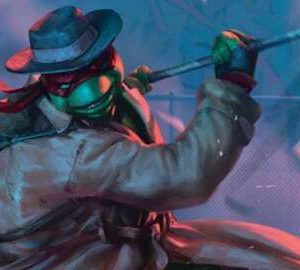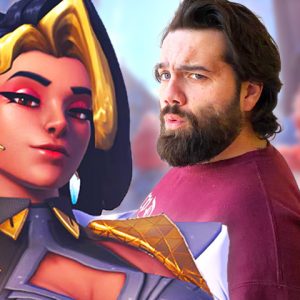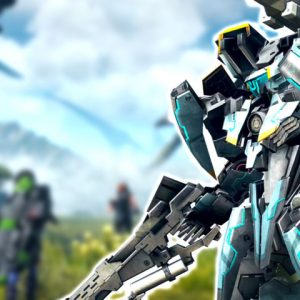Cyberpunk 2077: Phantom Liberty feels more like a top-to-bottom overhaul of the original game than a standard expansion. Of course, it will feature a new story with new characters and a new area to explore, but what left me most excited is how this expansion could potentially shake up the original experience and address many issues players had at launch.
Before our hands-on demo, quest director Paweł Sasko and quest designer Despoina Anetaky told us that nearly every system had been changed, tweaked, or redone entirely. Unlockable abilities in the skill tree feel more like perks rather than passive stat bonuses; the cybernetics are a lot more robust, offering more gameplay options; and the infamous police response system has been rebuilt from the ground up. This isn’t the first time developer CD Projekt Red has done something like this–The Witcher 3’s final expansion brought with it a number of changes to the UI and combat–but Phantom Liberty is attempting to comprehensively rewrite Cyberpunk’s DNA.
Phantom Liberty isn’t just a glorified update, though. It brings with it a story that leans heavily into the spy thriller genre and new characters including the gruff sleeper cell agent Solomon Reed (portrayed by the illustrious Idris Elba) and a new lawless district of Night City called Dogtown. The setup seems fairly simple: A mysterious character who goes by Songbird promises V that she can remove the deadly biochip from their head, if she can save and protect the president of the New United States after her aircraft crashes in Dogtown.
My session began in the seedy underbelly of Dogtown, a district nestled inside of Pacifica. Garbage littered the neon-washed alleyways, and cybered-up riffraff ambled the sidewalks. It was a sight not too far off from what we saw in Cyberpunk 2077, but Dogtown has a rugged lawlessness to it that feels more in line with the post-apocalyptic streets of Escape From New York than the compact and multilayered thoroughfares of Night City. This may seem strange given its location within Night City, but Dogtown is largely cut off from the city, acting more as an independent state rather than a district. Sasko and Anetaky told us that Dogtown is very difficult to enter and exit without the right connections. After completing the first few missions, V can enter and leave Dogtown as they please, but access to the area is closed off until you begin the expansion.

Gallery
It’s tough to give any firm impressions of the story based on what I played, but it seems CD Projekt Red is using this expansion to dig deeper into Johnny Silverhand’s character. At one point, while we were waiting for Solomon Reed by a run-down basketball court, Johnny reflected on his time in the army and grappled with his guilt for deserting. It was a messy, introspective moment that showed a side of Johnny we never really saw in Cyberpunk 2077. It’s clear that Johnny hates the establishment and everything the NUSA stands for, but listening to his rage-fueled rantings about how the military hides violence under the guise of hollow platitudes while simultaneously feeling guilty shows that it’s a chapter of his life that he’s never managed to close.
Of course, the star of the expansion is special agent Reed. He’s a gruff and charismatic undercover operative that is poised to play a central role in Phantom Liberty. Like Idris Elba himself, Reed has a commanding, larger-than-life presence to him. He’s confident, calculated, and imposing. My first encounter with Reed began with him jamming a gun into V’s side from behind as he vets them. It’s a great little introduction that fits nicely within the spy-thriller-inspired story. While I still have many questions about who Reed is and what his motives are, he seems like he could be a good foil to Johnny’s anarchist worldview.
What’s most impressive is how different Phantom Liberty feels compared to the vanilla experience and how these changes could breathe new life into the core experience. Nearly every system has been touched up or redone, and new mechanics have been introduced, such as car combat–and these features aren’t limited to Phantom Liberty.
For example, cybernetics received a complete overhaul. Now, armor is tied to your cyberware rather than clothing. This means you can wear whatever you want without worrying about your overall defense and combat effectiveness. However, you can’t install a bunch of cyberware at once. As you progress you’ll increase your cyberware limit, and if you install too much you’ll be hit with various debuffs. Not only that, but when you install new cyberware, you’ll get to see the installation process from V’s point of view. While we didn’t get specific examples of how cyberpsychosis could affect your character, getting debuffs from excessive cybernetics fits within the context of the world. It seems like a much more refined system that will force players to carefully pick and choose cyberware that fits their play style.
Skill trees across the board have also been reworked to introduce new abilities and perks that should spice up combat. Sasko told us that they wanted to get away from the percentage-based stat buffs that populated the original skill tree and build them around unique class-based skills. During my time, I only got to play as a fast solo build equipped with a thermal katana and mantis blades. Thanks to the new and improved Reflex skill tree, I could dash mid-air, deflect bullets, and perform gory finishers. I’m curious to see just how robust these revamped skill trees are, particularly when it comes to netrunning, but if my time with the fast solo build was any indication, I think there should be some cool surprises in store for every class archetype.
Phantom Liberty also brings with it the long-awaited revamped police and notoriety system. At launch, Cyberpunk 2077 was derided for its simplistic and unfair notoriety system. Police would spawn instantly and in random locations, even if there were no police nearby. That is not the case in Phantom Liberty. Now, similar to GTA V, if you commit a crime, the police will investigate. If you’re nearby, they will engage; if not, they will search the area. As you commit more crimes in quick succession, they will get more aggressive, and if you hit a five-star wanted level, MaxTac, a SWAT-like special forces unit in the Cyberpunk universe, will show up. Sasko told us that bosses will spawn in the world if you get your notoriety high enough. However, police aggression is also dependent on your location. They’ll be much quicker to respond in wealthier, more populated areas like Corpo Plaza.
When you do piss off the NCDP, you’re no longer limited to on-foot combat. Phantom Liberty introduces vehicular combat and weapon-mounted vehicles. Using the bumper buttons, you can aim your gun out the window and fire, and if you’re on a motorcycle you can wield melee weapons. I don’t know how practical swinging a katana from the side of a motorcycle actually is, but it sure looks badass. And to fit in with the spy-thriller aesthetic, you can even unlock a sports car with miniguns hidden behind the bumper a la James Bond’s famous Aston Martin.
These features aren’t locked to the new area or DLC story. They are global changes that will affect the entire game from start to finish and rebalance nearly every aspect of the experience. While you can load up old saves and still enjoy all these changes, there’s a compelling case to start fresh, as many of these mechanics are designed to reinforce Cyberpunk’s world-building and hone in on the role-playing aspects at its foundation.
The video game redemption arc has become all too common these days. I can’t blame people for giving up on Cyberpunk 2077 after its messy launch, but it was hard to deny its potential. And, based on what I saw of Phantom Liberty, Cyberpunk 2077 could finally live up to it.
The products discussed here were independently chosen by our editors.
GameSpot may get a share of the revenue if you buy anything featured on our site.
























